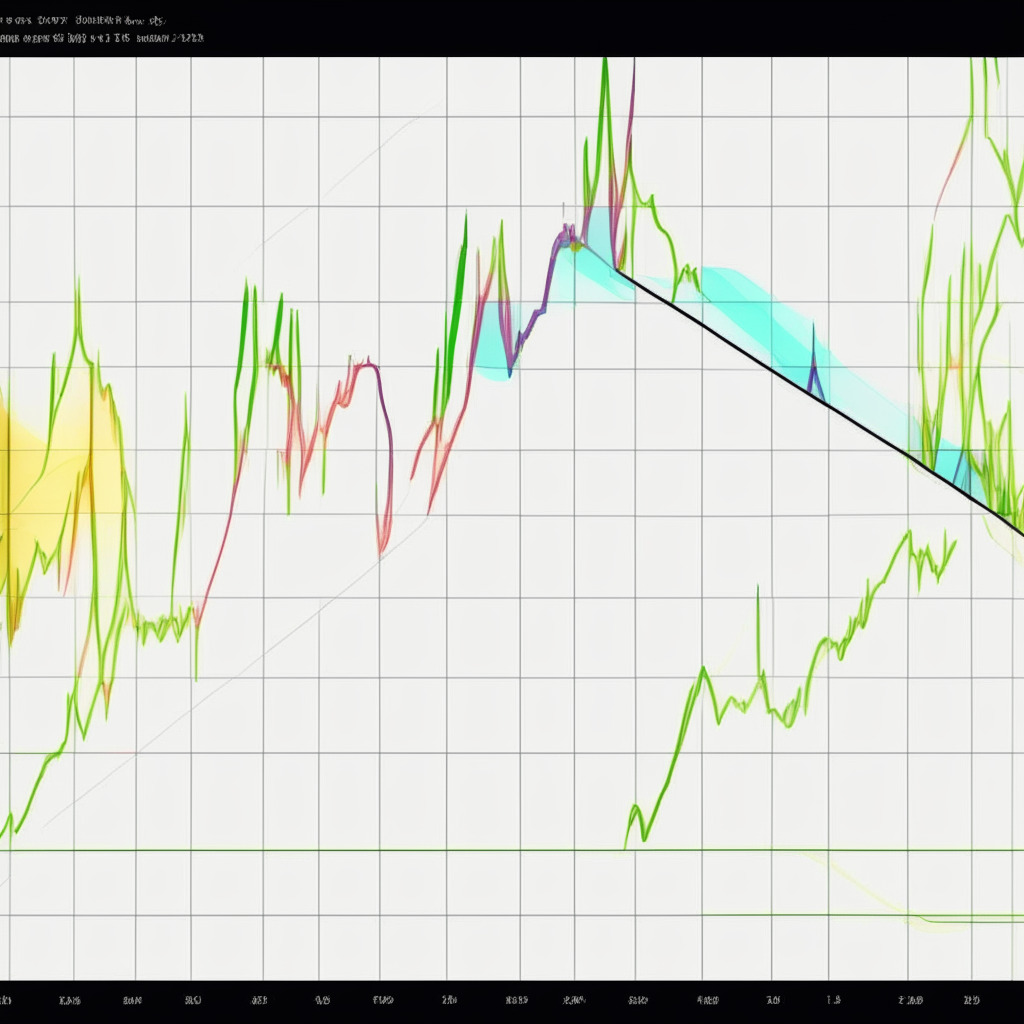“Polygon 2.0 is an ambitious project aiming to democratize blockchain governance through community participation. The project proposed the overhaul of the existing governance mechanism, planning to install several layer-2s backed by a comprehensive governance structure. These changes look to promote community involvement, streamline upgrade implementations, and establish a Community Treasury for ecosystem growth.”
Search Results for: POL
Exploring Polygon Labs’ Bold Governance Overhaul: Embarking on a More Democratic Future?
Polygon Labs plans to restructure the governance of its upcoming Polygon 2.0 roadmap. The system will be based on three primary pillars: democratization, System Smart Contracts Governance, and Community Treasury. Each pillar allows for community involvement and transparency, aiming to create an ecosystem that is community-driven and encourages progress in the technological landscape.
Forge: France’s First Licensed Crypto Provider – A Market Equalizer or Monopoly?
Forge, a Societe Generale subsidiary, is now France’s first licensed crypto provider. The company can custody, buy, sell, and trade digital assets for legal currency. However, the stringent approval process favors traditional banks, causing concerns over market fairness. This development underscores the balance between crypto business growth and regulatory prudence.
Bear vs Bull: Navigating Bitcoin’s Price Amid Unstable Market Factors and Political Influences
“Cathie Wood from Ark Invest forecasts Bitcoin’s price to reach up to $1.5 million by 2030, highlighting growing trust in the cryptocurrency. Despite US Congressman Ritchie Torres’ concerns over SEC’s stance towards cryptocurrency, Bitcoin’s resilience remains strong above the $30,000 mark.”
Polychain Capital’s Grand $400 Million Target Amidst Crypto Winter: A Leap or Fall?
“Blockchain venture capital firm, Polychain Capital, has raised nearly $200 million for its fourth cryptocurrency fund, aiming for a total of $400 million. Despite a challenging crypto market, the firm’s financial resilience and strategic changes prompt questions about the future of blockchain investments.”
Navigating the Crypto-Politics: Ron DeSantis vs CBDCs and the Pulsating Debate on Surveillance
“Florida Governor, Ron DeSantis, is staunchly opposed to Central Bank Digital Currencies (CBDCs), viewing them as tools for government-sanctioned surveillance. However, his disapproval doesn’t extend to cryptos like Bitcoin. This contradiction highlights the complex relationship between politics and digital currencies, prompting questions about government control versus personal freedom.”
Revolutionizing E-commerce: Blockchain-powered Loyalty Programs on Shopify Through Co:Create and Ethereum’s Polygon
“Web3 infrastructure firm Co:Create is launching an application on Shopify, utilizing Ethereum sidechain Polygon, to allow enterprises to implement blockchain-powered loyalty and rewards programs. This approach leverages non-fungible tokens (NFTs) and gamified experiences for deeper brand-customer engagement and digital ownership rights.”
Unveiling the Mystery Behind the Unexpected Surge in Polygon’s Value
The recent surge in MATIC’s price after a landmark court ruling dismissed it as a security, coupled with significant growth in decentralized applications (Dapps) on the Polygon Network, suggest potential for a rebound. However, the proposed token upgrade and competition from networks like Arbirtrum and Optimism imply that investors should proceed with caution.
Crypto Crusade: Blockchain Advocate’s Bid for Texas House and Wider Implications for Crypto Politics
“Steven Kinard, director of Bitcoin mining analytics at the Texas Blockchain Council, plans to run for the Texas House of Representatives. Advocating for digital freedom and strategic tech investments, he expresses concerns over the U.S. Federal Reserve’s attempts to introduce a CBDC. As the 2024 elections approach, the role of crypto regulation in legislative agendas holds prominence.”
Unraveling the Intricacies of Polygon’s Token Strategy: Maturing from MATIC to POL
Polygon, an Ethereum scaling solution, plans to change its native token from MATIC to POL. Touted as a “3rd generation token”, POL optimizes user experience across the protocol’s layer 2 ecosystem and enables holders to earn rewards as validators across multiple chains. This change prompts validators to embrace multi-chain roles, yielding varying rewards and potentially significant benefits.
Ondo Finance Expands to Polygon Network: A Shift in the Future of Tokenized Real-World Assets
Ondo Finance, an asset tokenization platform, is extending operations to the Polygon network. This expansion aims to meet increasing demand for tokenized financial instruments like US Treasuries, given their higher yields compared to decentralized finance markets. Ondo’s tokenized US government bond and intended yield-generating stablecoin will port to the Polygon network, a move mirroring asset management giant Franklin Templeton’s strategy.
Unpacking Polygon’s Proposal: From MATIC to POL, a Multipurpose Token Revolution
Polygon has proposed an upgrade to transform its MATIC token into a multipurpose one, now called POL. If approved, POL will be capable of serving multiple chains across all Polygon protocols without security compromise. This will introduce features like limitless scalability and seamless transitions, paving the way for broader blockchain use-cases and potential mass crypto adoption.
Revitalizing Classic Artworks with NFTs: A Leap or a Slip into Digitizing Jackson Pollock’s Creations?
The Jackson Pollock Studio’s collaboration with the Web3 art collective, Iconic Moments, brings 20th-century painter Jackson Pollock’s work into the digital realm through a collection of non-fungible tokens (NFTs). This venture bridges preservation and innovation, yet raises complexities regarding authenticity and the potential dilution of the original artwork’s value.
Unmasking Crypto’s Role in Politics: Salame, Bond, and the Campaign Finance Investigation
“Cryptocurrency figures, Ryan Salame and Michelle Bond, face scrutiny for possible violations of campaign-finance law. The investigation revolves around contributions from Salame to Bond’s political campaign and the source of Bond’s campaign loans. This raises questions about the intersection of politics and cryptocurrencies.”
Russia’s Digital Ruble: A Revolution in Finance or A Step Towards Financial Monopoly?
“Russia’s parliament is moving towards legislation for the ‘digital ruble’, their prospective Central Bank Digital Currency (CBDC). The proposed law hands power to the Bank of Russia to manage the CBDC infrastructure, issue currency, and guarantee safety. This move opens opportunities for new payment avenues and cross-border solutions, despite an initial skepticism and ban on digital assets.”
Cryptocurrency in Political Funding: A Closer Look at FTX Controversy and Legal Ramifications
“The US authorities are investigating former FTX executive, Ryan Salame, for alleged violations of campaign finance law. The probe explores financial linkages between Salame and Michelle Bond’s congressional campaign, and the potential exceeding of federal contribution limits. This investigation raises concerns about the intersection of cryptocurrencies and campaign finance laws.”
Exploring the Future of TV Entertainment: Blockchain, NFTs, and the Case of Krapopolis
“Krapopolis,” the first blockchain-based series from FOX’s Web3 division, is stirring conversations around blockchain and TV shows. As an NFT holder, fans control show elements, unlock unique content, and gain access to cast meetups. Despite a downturn in NFT market, the television industry is enthusiastic about integrating blockchain technology.
Presidential Candidate Bet on Bitcoin: Sincere Support or Political Strategy?
Democratic presidential candidate, Robert F. Kennedy Jr., has reportedly invested up to $250,000 in Bitcoin. This comes after his campaign announced its intention to accept Bitcoin donations. Despite having previously stated he was not an investor in cryptocurrency, Kennedy Jr. now seems to actively court the crypto community, emphasizing the importance of supporting the industry amidst increasing SEC scrutiny. No exact details were disclosed regarding his Bitcoin investment.
Power Plays in Crypto: Polygon Labs Leadership Transition Amidst Blockchain Evolution
“Leadership transitions in digital currencies have ripple effects, potentially impacting the organization and the crypto space. Recently, Polygon Labs’ president, Ryan Wyatt, announced his departure, with Marc Boiron, the existing CLO, assuming the CEO role. These changes coincide with Polygon’s planned upgrades under ‘Polygon 2.0’, aimed at decentralizing governance.”
Navigating the Future of Blockchain: Polygon’s Leadership Changes and Technological Shifts
Polygon Labs, known for its innovative blockchain efforts, has initiated strategic leadership changes, aligning with their transition towards “Polygon 2.0”. Devoting efforts to unifying Polygon chains via a “coordination layer”, they also plan to upgrade their legacy “PoS” chain for a compatibility with zero-knowledge proofs, advancing their commitment to confidentiality of transactions while bearing potential complexities and security risks.
Cryptocurrency Market Reacts to US Job Gains Miss: Link to Inflation and Fed Policy Decisions
The U.S. added 209,000 jobs in June, below the expected 230,000, causing a slight increase in Bitcoin’s price. Despite the jobs miss ending a 14-month trend of exceeding market anticipations, the overall robust job market places the Federal Reserve in a predicament with the unemployment rate dropping and inflation lingering above target.
The Monopoly Billion-Dollar Disagreement: FTX, 3AC, and SEC Vs BlockFi’s Bankruptcy Plans
“FTX, Three Arrows Capital (3AC), and the SEC contested BlockFi’s bankruptcy plans, arguing manipulation of rules involving billion-dollar disputed transactions. FTX alleges the plan reduces its claims against BlockFi, while 3AC and SEC question procedural fairness and sufficiency of the disclosure statement.”
Navigating the Regulatory Rift: Saxo Bank’s Crypto Divestment Dilemma amidst Evolving EU Policies
“Amid regulatory debates, Saxo Bank was compelled by the Danish Financial Supervisory Authority to divest from its crypto assets to maintain financial stability. However, the upcoming EU’s crypto regulatory framework, Markets for Cryptoassets regulation (MiCA), could reshape the crypto landscape post-2024.”
Cryptocurrency Use in Taiwan’s Political Arena: A Double-edged Sword
“The Taiwanese justice ministry raises concerns about the increased use of digital currencies like Bitcoin and Ethereum in corruption-backed activities. While these digital assets earn mainstream acceptance, regulating their use and ensuring ethical conduct is a growing challenge. A surge in cryptocurrency adoption, however, signifies a promising future.”
Unmasking the Poly Network Crypto Breach: A Bulldozer for Blockchain’s Security Crackdown
“The Poly Network was exploited, losing almost $10 million in ETH, confirmed via tweet on July 2nd. The hacker minted $34 billion worth of cryptocurrency, yet full cashout was hindered by liquidity constraints and security measures. Reports suggest an overpowered key governing Poly Network’s smart contract escalated the breach. Despite the setback, Binance reassured customers of their unaffected status.”
Blockchain Beats: The Future of Web3 Music with Warner Music and Polygon Labs
Warner Music Group and Polygon Labs have collaborated to launch a music accelerator program that fosters innovation in the intersection of music, technology, and Web3. The initiative supports decentralized music projects on the Polygon network, aiming to transform the distribution of music, stimulate artist-fan communities, and explore music-related merchandise opportunities.
MATIC Price Recovery: Can Polygon Coin Surpass $0.75 Amid Market Sentiment Shift?
The MATIC price displays a steady uptrend with dynamic support to buyers, suggesting the potential to surpass the $0.75 mark. However, decreasing volume in its current recovery and possible selling pressure from overhead trendlines could impact this momentum. Technical indicators suggest a short-term buy signal, but market conditions remain subject to change.
Cardano, Solana & Polygon Face Selloff: Robinhood & Celsius Crypto Liquidations Explained
Cardano, Solana, and Polygon face potential selloff as Robinhood Markets and Celsius plan to liquidate their crypto holdings due to the US SEC lawsuits against Binance and Coinbase. This has caused backlash from the crypto community and impacted the performance of these cryptocurrencies.
Japan’s Crypto Tax Policy Shift: Attracting Growth or Inviting Risks?
The Japanese National Tax Agency has softened its crypto taxation stance, benefiting corporations dealing with digital assets and potentially making Japan a hub for such companies. However, investors must remain vigilant as regulations and risks continuously evolve in this rapidly growing market.
CFTC Reviews Kalshi’s Political Betting Contracts: Why the Decision is Controversial
The U.S. CFTC has initiated a formal review and public comment period to examine prediction market Kalshi’s proposed contracts for betting on political party control of Congress. This development highlights the ongoing debate surrounding prediction markets and their place in the broader financial landscape, as regulators aim to balance opinions and concerns.
Bitcoin’s Purpose Debate: Digital Gold vs Activist’s Tool and the Impact on Regulatory Policies
The rise of institutionalization in the cryptocurrency world has prompted debate regarding Bitcoin’s purpose. Wall Street may adopt the “digital gold” narrative, representing Bitcoin as an asset independent of monetary policy. However, the chosen narrative could influence regulatory policy and may indirectly curtail Bitcoin’s usage growth, impacting privacy and KYC rules.































